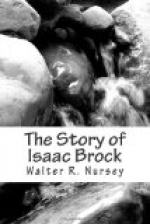The United States Secretary of War wrote to Hull, saying his action respecting Canadian Indians “met with the approval of the Government.” Evidently ashamed, upon reflection, of Hull’s threat, that same Government later instructed its commissioners at the Treaty of Ghent, when peace was restored, “to disown and disavow” their former Indian policy.
Hull’s extraordinary production, which proved a boomerang, was really the work of Colonel Lewis Cass, his Chief of Staff; but while Hull and Cass were “unloading their rhetoric at Sandwich,” our hero was “loading his guns at Mackinaw.”
CHAPTER XV.
BROCK ACCEPTS HULL’S CHALLENGE.
With the country’s call for a saviour had arisen the man so sorely needed. Vigilant, sagacious and brave, but with most inadequate forces, Brock, faced by a crisis, hurried to repel the invasion by Hull. If Canada was to be saved, Detroit, as well as Mackinaw, must be reduced. The confidence also of the savages must be retained. The smallness of his army demanded the neutrality of the redmen, if not their active aid.
The plan of his campaign was laid before his Executive Council and the members of his staff. As they parted at the door of the General’s quarters at midnight, preceding the day on which their gallant leader issued his counter reply to Hull, his final words were: “To hold Amherstburg, gentlemen, is of vital importance. It is the western base from which we must resist attack and advance upon Detroit. It must be held in force.”
Brock’s written answer to Hull’s flamboyant address—edited by his wise adviser, Judge Powell—was eloquent and dignified. Hull’s invitation to Canadians to seek protection from Britain under the flag of the United States was, he said, “an insult.” He cited the advantages of British connection, and warned the colonists that secession meant the restitution of Canada to the Empire of France. This was the price to be paid by America for the aid given by France to the revolting States during the War of Independence. He reminded them of the constancy of their fathers. “Are you prepared to become slaves to this despot Napoleon, who rules Europe with a rod of iron? If not, arise, repel the invader and give your children no cause to reproach you with sacrificing the richest inheritance of earth, participation in the name, character and freedom of Britons.”
He told them not to be dismayed by the enemy’s threat to “refuse them quarter should an Indian appear in their ranks.” “Why,” he continued, “should the brave bands of Indians which now inhabit this colony be prevented from defending their new homes?” These poor people, he reminded them, had actually been punished for their former fidelity to the United States, by the Government of that country taking from them their old homes in Ohio. The King of England had granted them a refuge and given them superior lands in Canada. Why were they to be denied the right to defend their hearths “from invasion by ferocious foes,” who, while utilizing Indians themselves, had condemned the practice in others? The threat to refuse quarter to these defenders of invaded rights would, he said, bring about inevitable reprisal, for “the national character of Britain was not less distinguished for humanity than retributive justice.”




